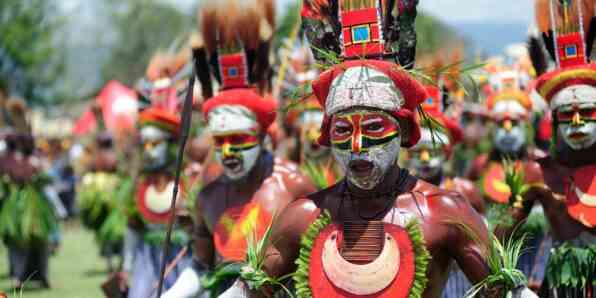If there is any least explored country on Earth, it is undoubtedly Papua — New Guinea. Hundreds and thousands of different peoples live here on a compact territory, with different customs and traditions, and the state power is present here only nominally.
Facts about Papua-New Guinea
- The most widely spoken language in the country is Tok Pisin Creole. The other two official languages in the state are English and Hiri-Motu, which is spoken in some countries of Oceania.
- Formally, the state is led by the British Queen, whose power on the island is represented by the Governor General. But only formally.
- The name “Papua” comes from the Malay language, in which it means “curly” — so the Spanish discoverer turned the shape of the hair of the natives into a dot on the map.
- The state has repeatedly changed its name – in its history it was called both Papua and New Guinea (as the country was called by the Spanish navigator, the second European to see the island), until it became independent from the European colonizers.
- The country occupies not only the island of New Guinea, but also over 6 hundred surrounding islets and reefs.
- There are 18 active volcanoes on the territory of the state, which periodically cause strong earthquakes (interesting facts about volcanoes).
- The state turned out to be at the junction of two lithospheric plates – the first is annually shifted by 7 cm to the north, and the second is shifted by 10 cm per year to the west.
- New Guinea in the distant past was a piece of the supercontinent Sahul.
- The first gold deposit in the country was discovered in the late 1880s, but the reserves of the precious metal were soon exhausted.
- According to experts, the state ranks 11th in the world in terms of gold production, and the total reserves of this metal on the islands is estimated at 2.3 thousand tons.
- More than 20,000 tropical plants grow on the lands of this island nation.
- The coast of New Guinea is surrounded by swampy and impenetrable mangroves, the width of which in some places reaches 35 km.
- Europeans colonized these territories only in the 19th century, and the natives of the islands at that time lived in the conditions of the Stone Age, no different in their way of life from their distant ancestors.
- For more than 10 years, a civil war was waged on the island of Bougainville for its separation from the rest of the state. To fight the rebels, the authorities mobilized about 2,000 military personnel (the entire personnel of the army), invited mercenaries from other countries and requested military assistance from the Australians. Some 20,000 people died as a result of this confrontation.
- In 2012, the vote in the country was disrupted by a cannibal sect that intimidated a potential electorate.
- Inhabitants of New Guinea and the surrounding islands speak more languages than the inhabitants of any other country on the planet. About 800 native dialects have been preserved on the islands, which is 10% of the total number of languages on Earth.
- Cuba provides medical assistance to the state and its inhabitants.
- The country’s army is recruited on a voluntary basis – on Young men over the age of 16 can enter the military service if they have completed school and have obtained the consent of their parents.
